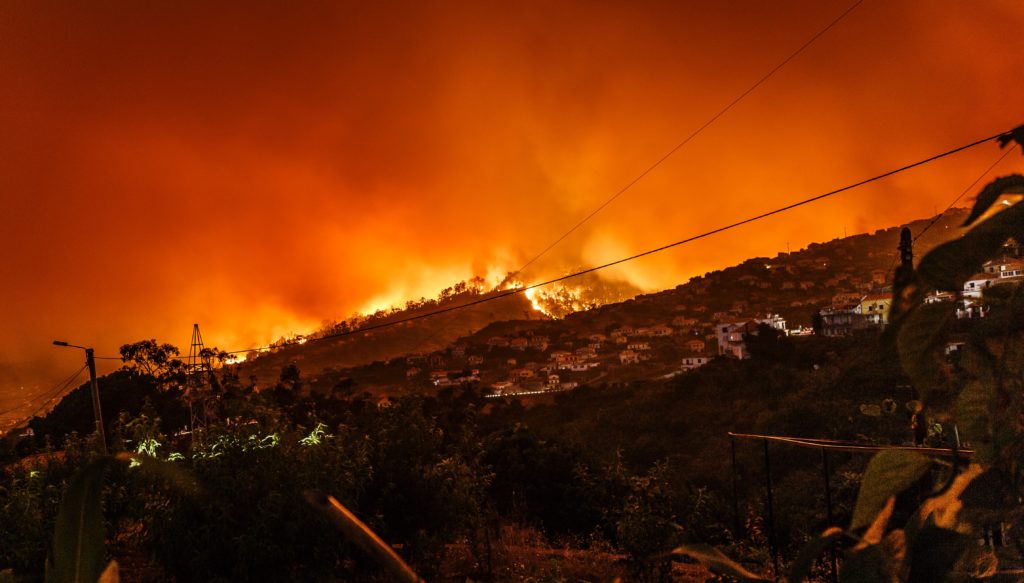The Western Cape Environmental Affairs Department is gearing up to face an extra risky wildfire season. On Thursday, November 4 they said that the possibility of wildfires breaking out is higher than in preceding years.
The added risk is because the COVID-19 lockdown prevented the fire department from doing its fire breaks and regular preparatory work in high-risk areas.
“This year we haven’t been able to do all the fire breaks to the levels of previous years and all the regular preparation work in risky areas of the province was severely disrupted due to the Covid lockdown,” said the Western Cape’s minister of Local Government, Environmental Affairs and Development Planning, Anton Bredell. “We also had a lot of rain this year. This was positive in one sense, but in another, it contributed to huge increases in biomass which provides fuel to wildfires.”
However, the department says that firefighters are fit and ready to respond. The wildfire risk is higher during the summer months in the Western Cape and the authorities begin preparing for it in October.
Firefighters were called to action approximately 17 000 times during the 2017/18 wildfire season — 2000 fires were reported in informal settlements, while 9000 were wildfires, says EWN.
Bredell is calling on the public to help reduce the risk of wildfires and report them as soon as they are spotted.
“We have prepared as we always do for the wildfire season that generally starts from October and lasts throughout the summer months. But we need the support of the public to help prevent fires and help keep us informed to be able to respond to fires as soon as possible.”
Colin Diener, the Chief Director of Disaster Management, says more resources are available to contain wildfires.
“In 2010, we had just eight aircraft. We’ve now moved up to, with all our partners, around almost 30 aircraft,” he said. “And then we’ve also got live satellite monitoring of the weather that picks up any fire larger 15 square metres.”
Diener also said that the Western Cape government would make a number of aircraft available.
“This year, the Western Cape government is providing eight spotter aircraft, four fixed-wing bombers, six Bell 205 Huey helicopters and the Black Hawk. In addition, the Cape Winelands provides three helicopters, the City of Cape Town two and Overberg one and the National Defence Force, we normally ask them to up their resources for us.”
Diener added that the coming summer is predicted to be hot and windy.
“In the past, this has contributed to the severity of wildfires. Early fire warnings remain critical to controlling fires quickly. When a fire does break out, getting control over it as quickly as possible is vital. If we can get to a fire within the first hour the possibility of a major incident is minimized.”
The five main causes of wildfires, according to the Western Cape Government, are:
– Intentional: Arson is a malicious and criminal act of deliberately starting fires.
– Smoking: Discarded cigarette butts can also cause wildfires, either from workers working in the fields or bush, passing pedestrians or motorists.
– Cooking fires: Open fires for cooking and discarded hot ashes can cause wildfires, particularly in nature conservation areas or on farms.
– Burning of debris: Permitted and unpermitted burning of debris, if badly managed or if weather conditions change suddenly, can cause fires.
– Lightning: Lightning is a cause of both wildfires and structural fires.
The Fire Danger Rating is determined by using a combination of the temperature, wind direction and speed; rainfall and humidity – which can be calculated manually or by using technology. The Fire Danger Rating Table is colour-coded, and this national system classifies the level of fire danger in five categories:
- Insignificant (blue). The fire danger is so low that no precautions are needed.
- Low (green). Fires, including prescribed burns, may be allowed in the open air on the condition that persons making fires take reasonable precautions against fires spreading.
- Moderate (yellow). No fires are allowed in the open air, except those that are authorised by the Chief Fire Officer of the local fire service, and those in designated fireplaces. Authorised fires may include prescribed burns.
- High (orange). No fires are allowed under any circumstances in the open air.
- Extreme (red). No fires are allowed under any circumstances in the open air, and special emergency fire preparedness measures are necessary
When reporting fires in the Western Cape please contact your Local District Municipality:
– City of Cape Town – 107 or 021 480 7700 and 080 911 4357
– Overberg – 028 425 1690
– West Coast – 022 433 8700
– Eden – 044 805 5071
– Central Karoo – 023 449 8000
– Cape Winelands – 021 886 9244 / 021 887 4446
Picture: Unsplash

